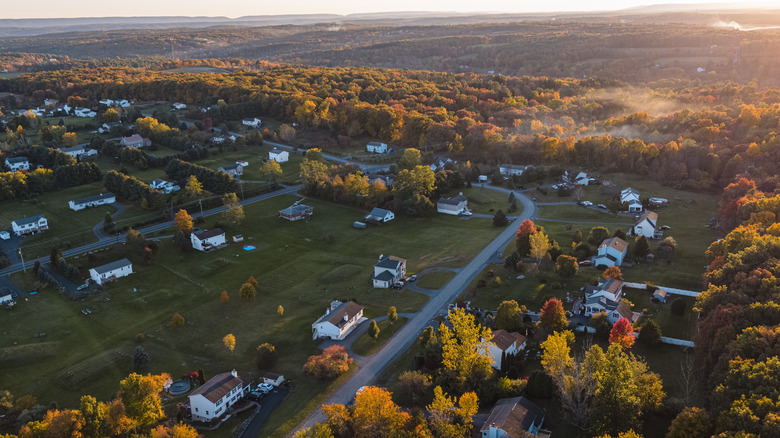Can Living In A City Improve Your Life Expectancy?
How many times have you escaped the busyness of city life and gone in search of sprawling mountains in a quiet countryside? Time almost always seems to stand still when you're surrounded by quiet and calm. While you might be tempted to give it all up and hole up in a cottage somewhere off the grid, you may want to rethink that decision — at least, if you want to live longer.
People have long talked about the healing power of living close to nature, and there's no denying the value in those claims. But Massachusetts Institute of Technology (MIT) researchers found that for adults over 65 years of age, living in metropolitan areas could offer improved longevity of life. Co-author of the 2019 paper, Amy Finkelstein told Express U.K., "There is a substantively important causal effect of where you live as an elderly adult on mortality and life expectancy across the United States. Whilst an area's 'health capital' — the local population's propensity to be obese, smoke, or suffer from chronic health diseases — plays an important role in longevity, the authors of the study also sought to investigate the environmental factors of metropolitan areas."
Yes, sipping simple black tea can do wonders for your life expectancy – but so can being close to the best healthcare, having less extreme weather conditions to put up with, better socioeconomic prospects, lower crime rates, and a lot more.
Those in rural areas don't have access to quality healthcare
There is no disputing the fact that cities are crowded. But urban areas also offer better access to healthcare, which was one of the key findings of the 2019 study.
Finkelstein explained to Express U.K., "Moving from a 10th to a 90th percentile location would increase life expectancy at age 65 by 1.1 years, and equalizing location effects would reduce cross-sectional variation in life expectancy by 15%. Places with favorable life expectancy effects tend to have higher quality and quantity of health care, less extreme climates, lower crime rates, and higher socioeconomic status."
According to a National Rural Health Association (NRHA) paper, in the year 2019, there were more deaths in rural areas than in cities. "Those living in rural areas tend to be older and sicker, are more likely to smoke, are more at risk for high blood pressure, and are more obese than residents living in urban areas," noted the findings. A Statistics Canada report found similar results in 2003. People in rural areas also face challenges like lack of transportation, poor access to medical insurance, and low government funding. The NRHA paper also focused on how isolation and lack of job opportunities make youth in rural areas turn to opioids. Between 1999 and 2015, "opioid death rates in rural areas quadrupled among those aged 18 to 25 and tripled for females," according to the study. Living in the city affects your health more than you think.
City life offers more impetus to exercise
You might think that vast open spaces with lush greenery around you would be reason enough reason to get outdoors and exercise — walk, cycle, run, etc. But a 2008 study done by researchers at the National Institute for Health Services Research in Utrecht, Holland, found that there is no positive correlation between green space and levels of activity.
In fact, the study found that those living close to nature actually walked and cycled less than those who didn't have access to green spaces — although they did spend more time gardening. Furthermore, a 2017 study studying population density and body fat, found that people living in residential areas exercised more and had lower levels of obesity than those living in suburban areas. Co-author Chinmoy Sarkar told the Thomson Reuters Foundation, "As cities get more and more compact, they become more walkable. In denser residential areas, they are better designed and more attractive destinations. We are less dependent on our cars and use public transport more." So perhaps, the question really isn't about what's accessible to us, but about what drives us to exercise.
It might be difficult to concretely choose one over the other as being better — city or country life — but factors such as access to healthy food, regular exercise, and good healthcare do play important roles. No matter where you choose to live, these key players could be the determinants of improved life expectancy.



